The four suspects in the terrorist attack on a theater on the outskirts of the Russian capital all came from Tajikistan, an ally in Central Asia that is considered Moscow's backyard.
ISIS-K, the Afghan branch of the Islamic State (IS) militant group, has claimed responsibility for the attack. The US government has also identified the group as being behind the attack, saying it had gathered intelligence about the terrorist threat from IS in early March and warned Russia.
However, the four suspects in the attack were not from Afghanistan, but were all citizens of Tajikistan, a Central Asian country that was once part of the Soviet Union and has deep historical ties to Russia. Tajikistan is now part of the Russia-led Collective Security Treaty Organization (CSTO), an alliance that President Vladimir Putin has long hoped would become a NATO-like version of the alliance.
Tajikistan, a country of 10 million people sandwiched between Uzbekistan, Afghanistan, Kyrgyzstan and China, is the poorest of the former Soviet states. Tajikistan has rich mineral resources, but they have not been fully developed due to low foreign investment and inadequate geological data.
Poverty and unemployment have also driven many Tajiks to Russia in search of work. An estimated 3 million Tajiks are currently migrant workers in Russia, most working in low-paid jobs in construction, manufacturing or cleaning public toilets.
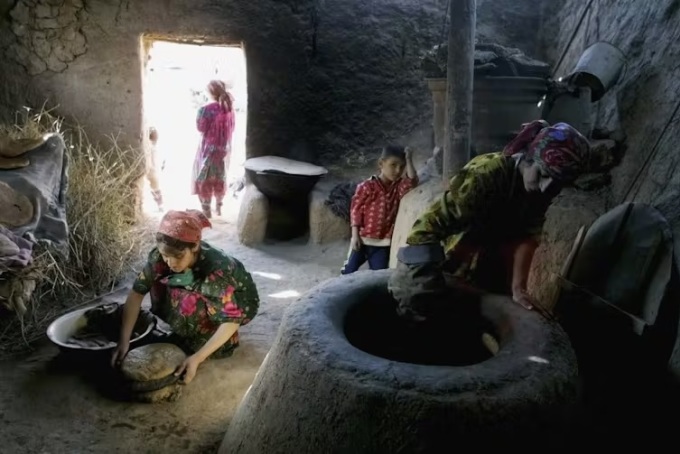
A family prepares to bake bread at their home in Dakhana Kiik village, Tajikistan. Photo: AP
Although Russia increasingly relies on migrant workers to fill domestic job needs, Russian attitudes toward people from Central Asia and the Caucasus region are generally not positive.
In Tajikistan today, university graduates find it almost impossible to find jobs that pay enough to support a normal family life. Living in poverty, they are easy targets for radical Islamist recruiters.
Along with poverty, Tajik society is also rife with religious tensions. Conservative Muslims were one of the main forces fighting the government during the 1992-1997 conflict, which killed more than 150,000 people and devastated the economy.
President Emomali Rahmon then issued many drastic measures to prevent religious conflicts, such as restricting the construction of mosques and banning women and children under 18 from going to mosques.
The specter of radical Islam from neighboring Afghanistan is also a reason for Mr. Rahmon to implement these policies. However, observers say that such strict regulations have contributed to promoting radical Islamist propaganda on social media in Tajikistan.
The rise of radical Islam, combined with difficult life in their homeland, is said to be the "perfect recipe" that led four Tajik suspects to be drawn into terrorist activities.
The suspect, Dalerjon Mirzoyev, 32, had entered Russia to find work and was granted a three-month temporary residence permit in the Siberian city of Novosibirsk, but the permit had expired.
The suspect, Saidakrami Rachabalizod, 30, was identified as having entered Russia on March 6 as a migrant worker, but had not registered his legal residence. Rachalbalizod had come to Russia to work and was arrested in 2018 on charges of violating the temporary residence period for immigrants. The suspect was then fined 2,500 rubles and deported from Russia.
Muhammadsobir Fayzov, 19, the youngest suspect, came to Russia to work as a hairdresser and registered as a temporary resident in the city of Ivanovo, east of Moscow.
Shamsidin Fariduni, 25, who has been identified as the group's leader, worked at a building materials factory in the city of Podolsk, southwest of Moscow. He also worked as a repairman and janitor in Krasnogorsk, a Moscow suburb that is home to the Crocus City Hall shopping mall and theater complex.
Location of Russia and Tajikistan. Graphic: World Atlas
But terrorist attacks since 2015 have been claimed by IS-affiliated groups. After IS declared its presence in Syria and Iraq in June 2014, thousands of people joined the extremist group, including hundreds from Tajikistan.
One of the most prominent to join IS is Gulmurod Khalimov, who was a Tajik special forces officer before defecting and joining IS in Syria in 2015.
The Russian campaign is considered one of the important reasons for IS's defeat in Syria. IS remnants retreated into the desert to restore their forces and increased their targeting of Russia, believing that Moscow had "oppressed Islam".
The group claimed responsibility for the 2015 bombing of a Russian plane carrying tourists back from the Egyptian resort of Sharm al-Sheik. Two years later, it claimed responsibility for a suicide bombing of a St. Petersburg metro train that killed 15 people.
Two weeks before the Crocus theater attack, Russian security forces said they had hunted down IS members who were planning an attack on a Moscow synagogue. Earlier this month, they announced the killing of six IS militants in the Ingushetia region, which borders Chechnya.
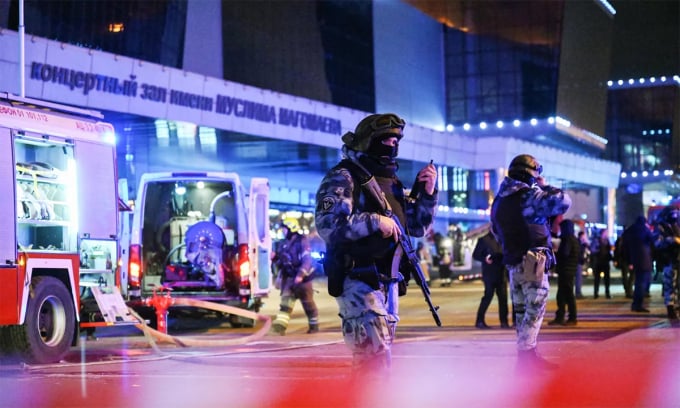
Russian security forces at the Crocus City Hall theater in Krasnogorsk, Moscow region on March 22. Photo: RIA Novosti
Observers say Russia's response to the Crocus theater attack could also drive a wedge between it and Tajikistan, one of its traditional allies in Central Asia.
Relations between Russia and Tajikistan have been strained in the past, as Moscow's influence in its "backyard" has been eroded by the conflict in Ukraine. Armenia, a Central Asian country and CSTO member, announced in February that it was suspending its participation in the collective security treaty, a move that was seen as a blow to Russia's image in the region.
In October 2022, President Rahmon strongly demanded that Russia respect Tajikistan. He said Tajikistan had to "beg" Russia to attend the Commonwealth of Independent States forum held in the country. "We have never been treated as strategic partners by Russia. We want respect," he said.
Bilateral relations could see further difficulties, with Russia likely to reconsider its policy of encouraging immigration from Central Asia, observers say. If Russia tightens its immigration policy, the lives of about a third of Tajikistan’s population will be severely affected, putting more pressure on the country.
Thanh Tam (According to The Conversation, Business Insider, AP )
Source link





![[Photo] General Secretary To Lam concludes visit to Russia, departs for Belarus](https://vphoto.vietnam.vn/thumb/1200x675/vietnam/resource/IMAGE/2025/5/11/0acf1081a95e4b1d9886c67fdafd95ed)
![[Photo] General Secretary To Lam arrives in Minsk, begins state visit to Belarus](https://vphoto.vietnam.vn/thumb/1200x675/vietnam/resource/IMAGE/2025/5/11/76602f587468437f8b5b7104495f444d)
![[Photo] General Secretary To Lam meets and expresses gratitude to Vietnam's Belarusian friends](https://vphoto.vietnam.vn/thumb/1200x675/vietnam/resource/IMAGE/2025/5/11/c515ee2054c54a87aa8a7cb520f2fa6e)






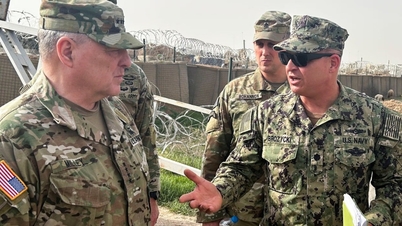



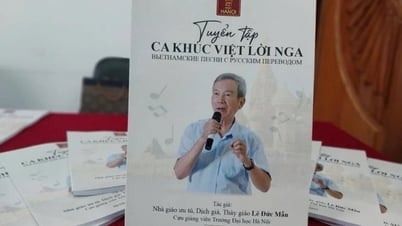

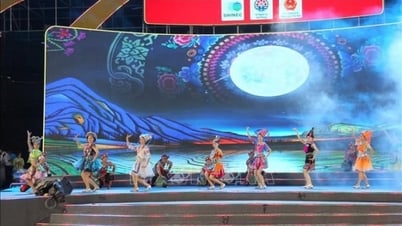












![[Photo] National Assembly Chairman Tran Thanh Man attends the Party Congress of the Committee for Culture and Social Affairs](https://vphoto.vietnam.vn/thumb/1200x675/vietnam/resource/IMAGE/2025/5/11/f5ed02beb9404bca998a08b34ef255a6)















































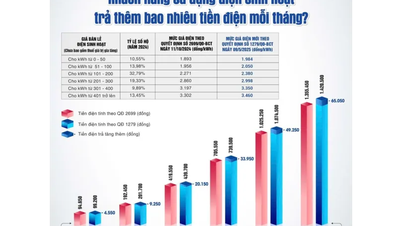

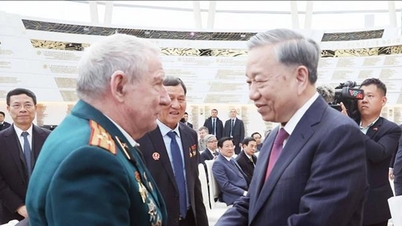


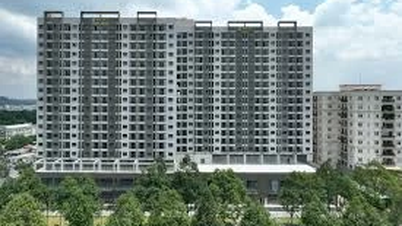











Comment (0)